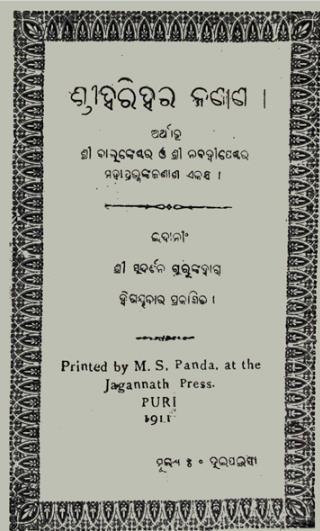In the rich tapestry of Odia literature, Shloka Muktabali, published in 1902 and edited by the eminent poet Nilamani Bidyaratna, stands out as a remarkable collection of poetry that reflects the artistic and philosophical spirit of its time. This work, which translates to “A Garland of Verses,” encapsulates the beauty, wisdom, and lyrical elegance characteristic of Indian poetic traditions, while simultaneously serving as a significant cultural artifact.
Shloka Muktabali is a compilation of diverse shlokas, or verses, that delve into various themes encompassing love, devotion, nature, and spirituality. Bidyaratna’s editing has resulted in a seamless flow of thought and emotion, providing readers with a reflective journey through the nuances of human experience. Each verse is imbued with rich imagery and metaphor, inviting readers to engage not just with the text but with their own inner landscapes.
One of the distinct qualities of Shloka Muktabali is its emphasis on philosophical and spiritual inquiry. Bidyaratna, drawing inspiration from classical texts and the broader traditions of Indian literature, weaves verses that explore existential themes, such as the meaning of life, the nature of the divine, and the interconnectedness of all beings. This pursuit of wisdom resonates with readers seeking a deeper understanding of their existence, making the book relevant even today.
The poetic structure of Shloka Muktabali demonstrates Nilamani Bidyaratna’s mastery over language and form. The precision of language, combined with rhythmic verses, creates a melodic quality that enhances the reading experience. This musicality is particularly important in Odia poetry, where the oral tradition plays a significant role in how verses are shared and remembered. Bidyaratna’s work serves to preserve the lyrical beauty of the Odia language and its poetic traditions, ensuring that the richness of the cultural heritage is passed down through generations.
Nature is another prominent theme in Shloka Muktabali. Bidyaratna vividly describes the landscapes of Odisha, using natural imagery to reflect emotions and philosophical concepts. Through his verses, readers are transported into the heart of the natural world, where mountains, rivers, and flora become symbolic representations of inner states and spiritual journeys. This connection to nature not only enriches the text but also fosters a sense of harmony between humanity and the environment, a concept that is increasingly resonant in contemporary discussions about ecological balance.
Moreover, Shloka Muktabali serves as a cultural touchstone, reinforcing a sense of identity and belonging among Odia speakers. In a time when regional languages were often overshadowed by colonial influences, Bidyaratna’s work celebrated the beauty of the Odia language, encouraging pride in local heritage. The book becomes a means of cultural expression, reminding readers of their roots and the vibrancy of their literary tradition.
As we reflect on the impact of Shloka Muktabali, it is essential to recognize its role in inspiring subsequent generations of poets and scholars. The themes explored in Bidyaratna’s verses continue to resonate, particularly in discussions about identity, spirituality, and the quest for knowledge. His ability to articulate profound truths through simple yet elegant verses makes his work both accessible and thought-provoking.
Books Info
| Books name | Shloka Muktabali Part-2 |
| Author | Nilamani Bidyaratna, Ed. |
| No Of pages | 10 |
| Publisher | NA |
| Publication | 1902 |
| Printed At | The jagannathPress |
| Distributor | NA |

